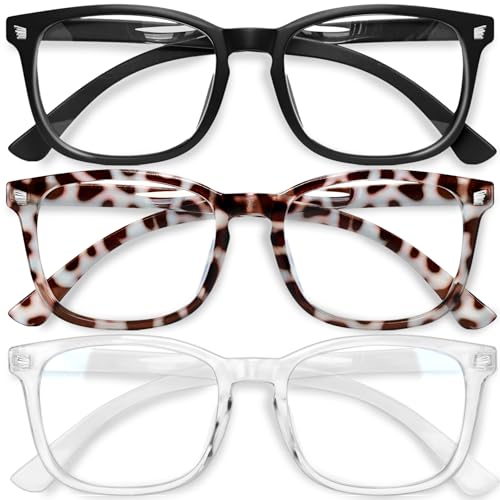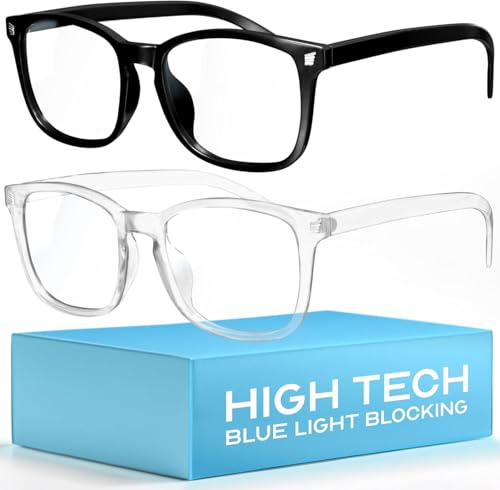When I spend long hours looking at the night sky through my telescope or on the computer, my eyes get tired. Staring at bright screens or electronic star maps exposes me to blue light, which strains my eyes and can make it harder to fall asleep.
Blue light glasses block or filter blue light, giving my eyes a break during astronomy sessions. They help reduce eye fatigue and headaches, especially when I use tablets or laptops to control telescopes or take notes.
Since astronomy happens at night or in dark environments, glasses that block the right amount of blue light help my eyes adjust better to darkness. When picking blue light glasses for astronomy, I check the fit, lens color, and how much blue light they block.
If the lenses are too dark or colored, they could affect how I see stars or celestial objects. Comfort matters because I sometimes wear the glasses for hours.
Best Blue Light Glasses for Astronomy
I know how important it is to protect my eyes during late-night stargazing or when using screens for astronomy. That’s why I picked out the best blue light glasses that help reduce eye strain and keep my vision comfortable.
Check out my top choices below.
VMJFBJ Blue Light Glasses
If you want comfortable blue light glasses that help reduce eye strain and fit well for late-night astronomy sessions, this is a solid pick.
Pros
- Very lightweight—I almost forget I’m wearing them
- The amber lens softens harsh screen glare
- Stylish oversized frame looks modern and feels sturdy
Cons
- Slight yellow tint may bother some people under bright lights
- Only three color choices
- Doesn’t fully block blue light outside the listed range
When I put on the VMJFBJ Blue Light Glasses during late-night stargazing runs and while checking astronomy apps, my eyes felt less tired. The amber lenses filtered out harsh blue tones from my screens without making everything look strange.
Wearing them for hours never felt heavy or uncomfortable. The glasses don’t slip off my face when I move around adjusting equipment.
The simple and clean design works well indoors or out, and they don’t look out of place. There is a small yellow tint when looking at some white screens, but I got used to it quickly.
They come with a nice cleaning cloth and box to keep things handy and clean for regular use. For anyone who mixes astronomy with lots of screen work, these are a smart buy.
Livho Titan Blue Light Glasses
If you want a budget-friendly pair of blue light glasses that make astronomy sessions more comfortable on your eyes, these are a solid choice.
Pros
- Eased my eye strain during long nights at the computer and telescope
- Lightweight enough that I forgot I had them on after a while
- Didn’t mess up the colors on my screens or star charts
Cons
- Lenses pick up fingerprints and smudges quickly
- A bit snug behind my ears after a few hours
- Simple design lacks extra padding or fancy features
When I wore the Livho Titan glasses during late-night telescope work and dark sky research, I noticed a difference in my comfort. My eyes didn’t feel as tired, even after hours of switching between my computer, star maps, and telescope controls.
The frames sat lightly on my nose without pinching, and I didn’t need to adjust them constantly. The lenses didn’t distort the colors or make the screens look strange, which is important while viewing astronomy images or using stargazing apps.
They attracted smudges, so I kept a lens cloth nearby. They also started to feel a little tight around my ears by the end of the night—people with larger heads might notice this more.
If you need something basic and effective for most head sizes, the Livho Titan is worth trying.
Benicci Blue Light Glasses
If you want affordable blue light glasses that are lightweight, stylish, and easy to take anywhere, this is a good pick.
Pros
- Light and comfortable for all-night stargazing or computer work
- Comes with a strong, protective carrying case
- Helps reduce eye fatigue when using screens or looking at astronomy charts
Cons
- Blocks only some blue light, not all
- Made mostly from plastic, so the frame doesn’t feel premium
- Fit might not be perfect for every face size
I used the Benicci Blue Light Glasses during a late-night astronomy session while switching between star maps on my laptop and gazing through my telescope. They felt very light on my face and didn’t slide down my nose, which is helpful when I’m constantly looking up and down.
The case is sturdy and gives me peace of mind when tossing them into my backpack. After several hours at the computer, my eyes didn’t feel as tired or dry as usual.
The lenses block out blue light and glare from screens, making it easier to focus on planning my night sky observations. If you want glasses that block all blue light, these might not be strong enough for very sensitive eyes.
I liked their classic look; they didn’t feel out of place when I wore them out during the day. They’re mostly plastic, so they don’t have a premium feel, but they get the job done for the price.
For anyone who spends time in front of bright screens or digital devices doing astronomy, these glasses offer solid comfort and good value.
ANRRI Blue Light Glasses
If you want blue light glasses that are comfortable and help with eye strain during long astronomy sessions, these are a solid choice.
Pros
- Light frame is easy to wear for hours
- Noticeable relief from eye tiredness and headaches
- Helps me sleep better after late-night stargazing
Cons
- Frame feels a bit basic, not much style
- Lenses can smudge easily if not cleaned often
- May not fit very large heads perfectly
Putting on my ANRRI Blue Light Glasses for a long astronomy session made a clear difference. My eyes didn’t burn or feel heavy after tracking stars on my laptop for hours at night.
I don’t wear glasses every day, but these felt so light I forgot I had them on. By the end of the night, I didn’t have that usual headache or dry eyes that come from looking at digital star charts.
Falling asleep after a late night outside was much easier, too. The lenses filter a lot of blue light, so my eyes felt relaxed even when looking at my phone before bed.
Cleaning the lenses is important, as they pick up fingerprints quickly. The style is plain, but they do a good job without getting in the way.
Bloomoak Blue Light Glasses
For anyone spending hours at the telescope screen or doing late-night stargazing, these glasses are a solid pick for protecting your eyes and helping you wind down before bed.
Pros
- I felt much less eye strain after long sessions at my computer and telescope.
- The frame is super lightweight, so I barely noticed I had them on.
- My sleep improved when I wore them before bedtime.
Cons
- The reddish lens tint can look a bit odd in regular social settings.
- Not ideal for reading regular books or driving at night.
- If you prefer a clear lens, the color might take time to get used to.
I spent most of my last observing session wearing the Bloomoak Blue Light Glasses, and I could tell the difference. My eyes didn’t get tired like they used to, especially when I checked digital charts on a tablet or laptop.
The amber tint made the screen easier to read in the dark. Comfort stood out right away.
The glasses rest so lightly on my face, I forgot I was wearing them after just a few minutes. Even after several hours outside, there was no pinching or slipping, which is a big relief on long astronomy nights.
The lens color is definitely on the orange side, so I take them off when not in front of screens. If you’re just starting to use blue light glasses for astronomy, the Bloomoak model delivers on less eye fatigue and gives you a better night’s sleep.
Buying Guide
When I buy blue light glasses for astronomy, I look for lenses that block blue light without changing colors. Clear lenses are best because I want to see stars and planets with true colors.
I avoid glasses that add a yellow or orange tint because these can mess with how I see the night sky. It helps to check if the glasses say “low color distortion.”
Fit and comfort matter when I spend hours stargazing. I try on different sizes and shapes to find frames that sit comfortably on my nose and ears.
I always check the frame material. I pick lightweight options, like plastic or nylon, so they don’t feel heavy during long viewing sessions.
Key Features Checklist
| Feature | What I Look For |
|---|---|
| Lens Clarity | Clear, minimal tint |
| Comfort | Soft nose pads, lightweight |
| Frame Durability | Strong, flexible material |
| Color Distortion | Low to none |
| Size Options | Fit my face snugly |
Sometimes, I also look for an anti-reflective coating. This coating reduces glare from my telescope or computer screen.
Easy cleaning and scratch-resistant coatings keep my glasses in good shape. I always check the cleaning instructions in the product details.
I try different pairs if possible. This helps me find a pair that fits my face and works well for astronomy.

















